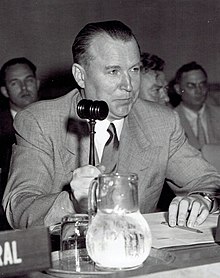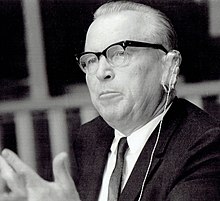China is one of the members of the United Nations and is one of five permanent members of its Security Council. One of the victorious Allies of World War II, the Republic of China (ROC) joined the UN upon its founding in 1945. The subsequent resumption of the Chinese Civil War between the government of Republic of China and the rebel forces of the Chinese Communist Party, led to the latter's victory on the mainland and the establishment of the People's Republic of China (PRC) in 1949. Nearly all of Mainland China was soon under its control and the ROC government retreated to the island of Taiwan.

The Soviet Union was a charter member of the United Nations and one of five permanent members of the Security Council. Following the dissolution of the Soviet Union in 1991, its UN seat was transferred to the Russian Federation, the successor state of the USSR.

The School of International Service (SIS) is American University's school of advanced international study, covering areas such as international politics, international communication, international development, international economics, peace and conflict resolution, international law and human rights, global environmental politics, and U.S. foreign policy.
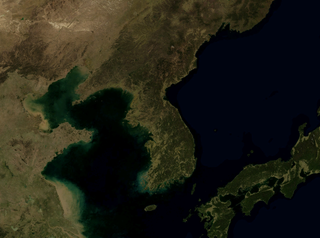
Resolution 82 was adopted by the United Nations Security Council (UNSC) on 25 June 1950. It condemned the "armed attack on the Republic of Korea by forces from North Korea", while calling for "the immediate cessation of hostilities" and for "the authorities in North Korea to withdraw forthwith their armed forces to the 38th parallel". The measure was adopted with 9 voting for, none opposed, and one abstention by Yugoslavia. The Soviet Union was absent, as it was boycotting the UN at the time for its recognition of the Republic of China as China's representative to the organization.
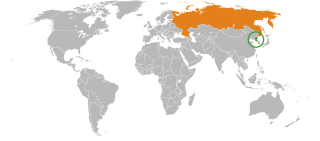
North Korea–Russia relations are the bilateral relations between Russia and North Korea. The Soviet Union was the first to recognize North Korea on October 12, 1948, shortly after the proclamation, as the sole legitimate authority in all of Korea. The Soviet Union supported North Korea during the Korean War. North Korea was founded as part of the Communist bloc, and received major Soviet military and political support. The comprehensive personality cult around North Korea's ruling family was heavily influenced by Stalinism. China and the Soviet Union competed for influence in North Korea during the Sino-Soviet split in the 1960s, as North Korea tried to maintain good relations with both countries.

On 20–21 August 1968, the Czechoslovak Socialist Republic was jointly invaded by four Warsaw Pact countries: the Soviet Union, the Polish People's Republic, the People's Republic of Bulgaria, and the Hungarian People's Republic. The invasion stopped Alexander Dubček's Prague Spring liberalisation reforms and strengthened the authoritarian wing of the Communist Party of Czechoslovakia (KSČ).

The establishment of diplomatic relations between Albania and the Soviet Union happened on April 7, 1924. Both countries were also allies in the Warsaw Pact. Albania has an embassy in Moscow. Russia has an embassy in Tirana.

United Nations Security Council Resolution 1874 was adopted unanimously by the United Nations Security Council on 12 June 2009. The resolution, passed under Chapter VII, Article 41, of the UN Charter, imposes further economic and commercial sanctions on the Democratic People's Republic of Korea and encourages UN member states to search North Korean cargo, in the aftermath of an underground nuclear test conducted on 25 May 2009.

Albania and China established diplomatic relations on November 23, 1949. Albania has an embassy in Beijing and China has an embassy in Tirana.

Ernest A. Gross was a United States diplomat and lawyer who headed the U.S. delegation to the United Nations in the lead-up to the Korean War.

The permanent members of the United Nations Security Council are the five sovereign states to whom the UN Charter of 1945 grants a permanent seat on the UN Security Council: China, France, Russia, United Kingdom, and United States.

Josip Broz Tito, President of Yugoslavia and President of the League of Communists of Yugoslavia, died on 4 May 1980 following a prolonged illness. His state funeral was held four days later on 8 May, drawing a significant amount of statesmen from Western, Eastern and Non-Aligned countries across the world. The attendees included four kings, six princes, 22 prime ministers, 31 presidents, and 47 ministers of foreign affairs. In total, 128 countries out of the 154 UN members at the time were represented. Also present were delegates from seven multilateral organizations, six movements and forty political parties.

The Republic of Korea and the Democratic People's Republic of Korea were simultaneously admitted to the United Nations (UN) in 1991. On 8 August 1991, the UN Security Council passed Resolution 702, recommending both states to the General Assembly for membership. On 17 September 1991, the General Assembly admitted both countries under Resolution 46/1.

The term Big Four Conference may refer to one of several conferences between heads of state or foreign ministers of the victorious nations after World War I (1914–18) or during and after World War II (1939–45).

The United Nations General Assembly resolution 498 was approved on February 1, 1951, in response to the intervention of Chinese Communist troops in Korean War.
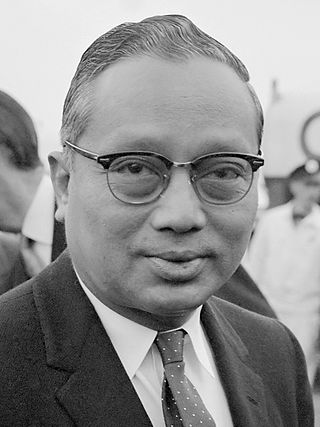
A United Nations Secretary-General selection was held in 1961 to replace Dag Hammarskjöld after he was killed in a plane crash. After initial Soviet attempts to replace the secretary-general with a troika, it was agreed that an acting secretary-general would be appointed for the remainder of Hammarskjöld's term. Within two weeks, U Thant of Burma emerged as the only candidate who was acceptable to both the Soviet Union and the United States. However, the superpowers spent another four weeks arguing over the number of assistant secretaries-general, before finally resolving their dispute by allowing Thant to decide for himself. Thant was then voted in unanimously for a term ending on 10 April 1963.

Wu Xiuquan was a Chinese Communist revolutionary, military officer, and diplomat. He studied in the Soviet Union, enlisted in the Chinese Red Army, and participated in the Long March. After the founding of the People's Republic of China, he served as Vice Minister of Foreign Affairs, China's first ambassador to Yugoslavia, and Vice Minister of the International Department of the Chinese Communist Party. After being imprisoned for eight years during the Cultural Revolution, Wu was appointed Deputy Chief of the People's Liberation Army General Staff Department in 1975 and later served as vice president of the special court that tried and convicted the Gang of Four and the Lin Biao clique of numerous crimes during the Cultural Revolution.

Soviet involvement in regime change entailed both overt and covert actions aimed at altering, replacing, or preserving foreign governments. In the 1920s, the nascent Soviet Union intervened in multiple governments primarily in Asia, acquiring the territory of Tuva and making Mongolia into a satellite state. During World War II, the Soviet Union helped overthrow many puppet regimes of Nazi Germany and the Empire of Japan, including in East Asia and much of Europe. Soviet forces were also instrumental in ending the rule of Adolf Hitler over Germany.
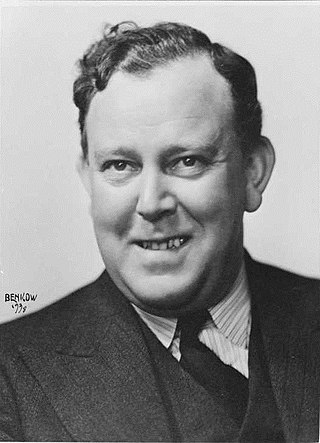
The United Nations Secretary-General selection of 1950 took place as the Cold War turned hot in the Korean War. The Soviet Union vetoed Trygvie Lie's second term and offered to vote for any other candidate. However, the United States insisted that Lie had to continue in office as Secretary-General, pressuring its allies to abstain on all other candidates. When a Latin American candidate appeared to have enough votes to win, the United States threatened to use its veto for the first time. After a second round of voting with no candidates receiving the required majority, the Security Council informed the General Assembly that it had been unable to agree on a recommendation. The General Assembly then extended Lie's term for three years.
The Soviet Union boycotted the United Nations from 13 January until 1 August 1950. The boycott originated over a dispute over the representation of China before the United Nations. The Soviet Union demanded that representatives of the People's Republic of China (PRC) be seated in the United Nations Security Council while the United Nations recognized representatives of the Kuomintang and the Republic of China. After the Soviet Union lost a motion to seat the PRC in the UN on 13 January 1950, it decided to boycott the organization.
